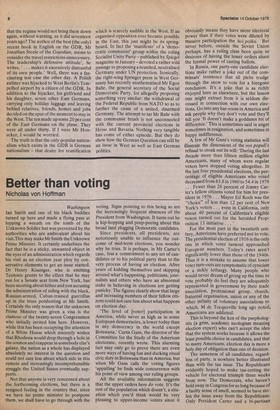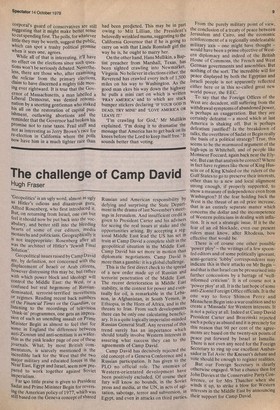Better than voting
Nicholas von Hoffman
Washington Ian Smith and one of his black buddies turned up here and made a flying pass at lopping a wreath on the tomb of the Unknown Soldier but was prevented by the authorities who are ambivalent about his visit.This may make Mr Smith theUnknown Prime Minister. It certainly underlines the fact that he is a sticky, unwanted object in the eyes of an administration which regards his visit as an election year ploy by conservative elements to get an issue started. Dr Henry Kissinger, who is emitting Teutonic grunts to the effect that he may run for a Senate seat from New York, has been snorting about hither and yon accusing the administration of siding with the black, Russian-armed, Cuban-trained guerrillas up in the trees potshotting at Mr Smith. Certainly the only reason that the unknown Prime Minister was given a visa is the clamour of the twenty-seven Congressmen who initially invited him here. However, while this has been occupying the attention of a White House which sincerely wishes that Rhodesia would drop through a hole in the cosmos and reappear in somebody else's galaxy, the nation as a whole has displayed absolutely no interest in the question and could not care less about which side in this remote and increasingly incomprehensible struggle the United States eventually supports.
Not that anyone is very concerned about the forthcoming elections, but there is a resigned feeling in the country that, since we have no prime minister to postpone them, we shall have to go through with the voting. Signs pointing to this being so are the increasingly frequent absences of the President from Washington. It turns out he is hip-hopping and peep-peeing about this broad land plugging Democratic candidates.
Since presidents, all presidents, are notoriously unable to influence the outcome of mid-term elections, you wonder why he tries. It is perhaps, in Mr Carter's case, less a commitment to any set of candidates or to his political party than to the very process of having an election. After years of kidding themselves and skipping around what's happening, politicians, journalists and others who have an abnormal stake in believing in elections are getting • panicky. The figures clearly show that large and increasing numbers of their fellow citizens could not care less about what happens on election day.
'The level of [voter] participation in America, while never as high as in some European democracies, is lower today than in any democracy in the world except Botswana,' Curtis Gans, the director of the Committee for the Study of the American electorate, recently wrote. This alarming fact may only go to prove there are even more ways of having fun and ducking ritual civic duty in Botswana than in America, but when Mr Gans calls the voting figures 'appalling' he finds wide concurrence with his point of view among our ruling groups.
All the available information suggests that the upper orders here do vote. It's the rest of the population which doesn't, a situation which you'd think would be very pleasing to upper-income voters since it obviously means they have more electoral power than if their votes were diluted by massive participation the hoi polloi. But never before, outside the Soviet Union perhaps, has a ruling class been quite so desirous of having the lesser orders share the formal power of casting ballots.
In Russia, one party-one candidate elections make rather a joke out of the commissars' insistence that all plebs trudge through the snow to vote for a foregone conclusion. It's a joke that is as richly enjoyed here as elsewhere, but the lesson one might extract from it is seldom discussed in connection with our own elections. Go into any bar-room in America and ask people why they don't vote and they'll tell you 'It doesn't make a goddamn bit of difference.' This is sometimes said in anger sometimes in resignation, and sometimes in happy indifference. A few of Mr Gans's voting statistics will illustrate the dimensions of the vox populi's refusal to croak out its will: 'During the last decade more than fifteen million eligible Americans, many of whom were regular voters have stopped voting altogether. In the last four presidential elections, the percentage of eligible Americans who voted decreased from 63.8 in 1960 to 54.4 in 1976 . . . Fewer than 28 percent of Jimmy Carter's fellow citizens voted for him for president in 1976 . . . Mayor Ed Koch was the "choice" of less than 12 per cent of New York's voters . . . even in California, only about 40 percent of California's eligible voters turned out for the heralded Proposition 13 initiative .
For the most part in the twentieth century, Americans have preferred not to vote. The presidential election of 1916 is the only one in which voter turnout approached European numbers. Today's rates aren't significantly lower than those of the 1940s. Thus it is a mistake to assume that lower voter turn-outs are symptomatic of cynicism or a sickly lethargy. Many people who would never dream of giving up the time to vote probably do feel they are adequately represented in government by their trade association, professional group, church, fraternal organisation, union or any of the other infinity of voluntary associations to which, M de Tocqueville long ago noted, Americans are addicted.
This is beyond the ken of the psephologists (a grim, academic neologism meaning election expert) who can't accept the idea that the system works because it allows the least possible choice in candidates, and that to many Americans, election day is more a holy day of obligation than one of decision.
The sameness of all candidates, regardless of party, is nowhere better illustrated than with the tax issue. The Republicans evidently hoped to make tax-cutting the vehicle for electoral triumph three weeks from now. The Democrats, who haven't held sway in Congress for so long because of a -faulty sense of smell, seemed to have sto len the issue away from the Republicans. Only President Carter and a bi-partisan corporal's guard of conservatives are still suggesting that it might make better sense to cut spending first. The polls, for whatever little they may be worth, suggest the public, Which can spot a trashy political promise when it sees one, agrees. While all of that is interesting, it'll have no effect on the elections since such questions won't be seriously debated. Nevertheless, there are those who, after examining the refictae from the primary elections, Claim to have discerned a mighty tide moving ever rightward. It is true that the Governor of Massachusetts, a man labelled a Liberal Democrat, was denied renomination by a snorting gentleman who staked his all on the restoration of capital punishment, outlawing abortions and the reminder that the Governor had broken his promise not to raise taxes. Frail stuff and not as interesting as Jerry Brown's race for re-election in California where the polls now have him in a much tighter race than had been predicted. This may be in part owing to Miz Lillian, the President's belovedly wrinkled mama, suggesting to the California Governor that if be is going to carry on with that Linda Ronstadt girl the way he is, he ought to marry her. On the other hand, Hans Mullikin, a Baptist preacher from Marshall, Texas, has been sighted crawling into Newmarket, Virginia. No believer in elections either, the Reverend has crawled every inch of 1,500 miles on his way to Washington. As the good man ekes his way down the highway he pulls a mini cart on which is written 'PRAY AMERICA' and to which are stuck bumper stickers declaring 'IF YOUR GOD IS DEAD, TRY MINE' and 'LOVE AMERICA OR LEAVE IT,' 'I'm crawling for God,' Mr Mullikin explained. 'I'm doing it to dramatise the message that America has to get back on its knees before the Lord to keep itself free.' It sounds better than voting.



































 Previous page
Previous page